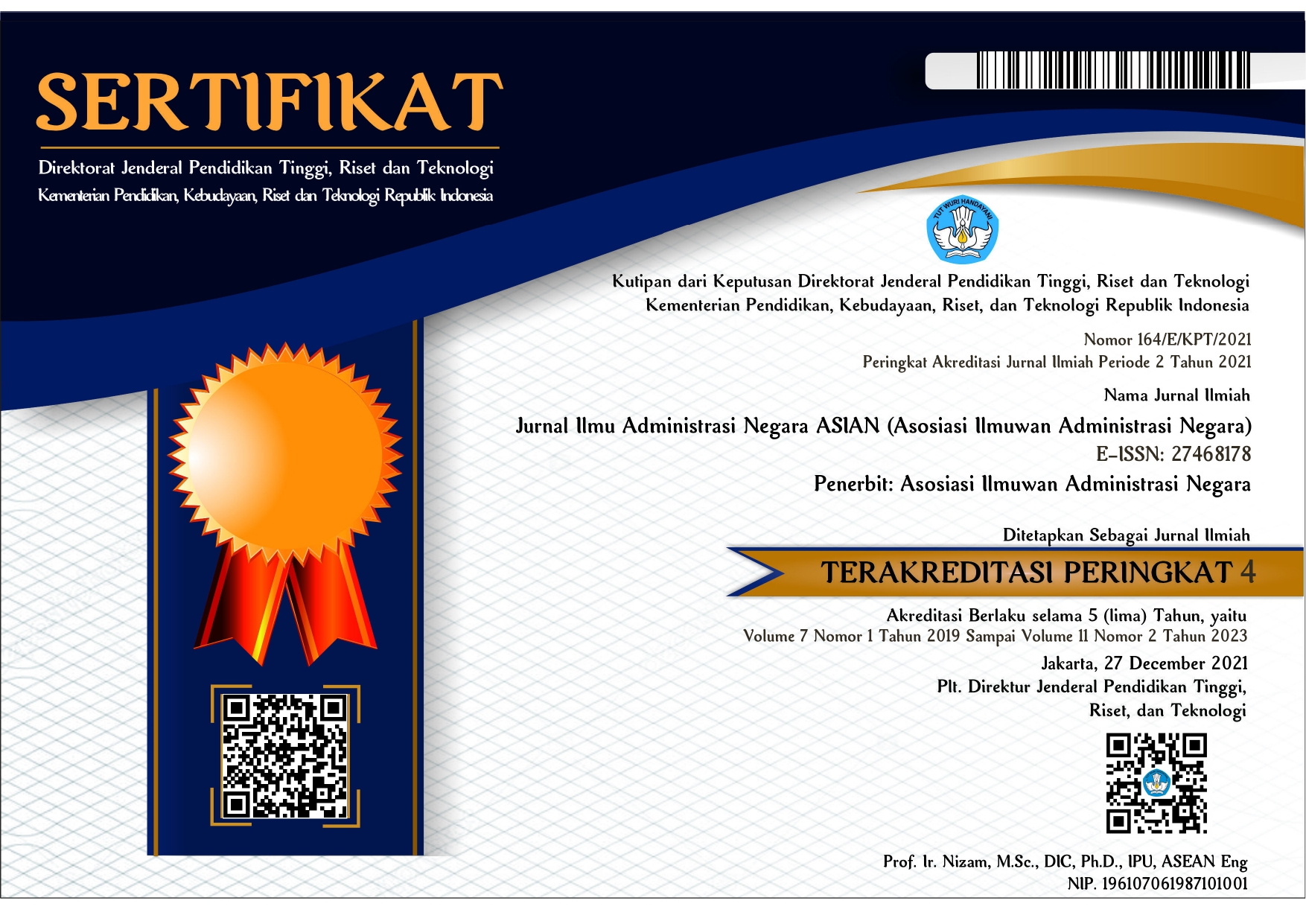Exploration of Accountability Practices: A Study of the Secretariat of the House of Representatives
 Abstract views: 398
,
Abstract views: 398
,
 PDF downloads: 241
PDF downloads: 241
Abstract
The review explores the significance of the SAKIP System, focusing on the Secretariat General of the Indonesian House of Representatives, examining both practical and theoretical aspects. An accountability index of 67.46 emerged, resulting in a "B" predicate. This finding reveals a notable discrepancy compared to the target of 75.00, highlighting a gap between theoretical frameworks and practical implementation of accountability. The research employs a qualitative descriptive methodology, utilizing a desk study to analyze audit data and interpret the findings. Results emphasize the necessity for a collaborative approach to enhance transparency and accountability in the internal audit process. Such attributes play a vital role in strengthening the virtue of programs or outputs produced through audits. The study suggests that accountability goes beyond formal procedures, representing a dynamic interaction among institutions that can bolster legitimacy in practice. Additionally, it fosters a culture of continuous improvement in Government performance. Ultimately, this research contributes to the discourse on accountability by promoting a more integrated and participatory approach within Government operations.
Downloads
References
Afifah, A. N., Dirgantari, N., Pratama, B. C., & Wibowo, H. (2022). Sakip-Based Public Accountability for Local Governments in Central Java Province. International Journal of Economics, Business and Accounting Research (IJEBAR), 6(4), 1802–1820.
Akinyode, B. F., & Khan, T. H. (2018). Step by step approach for qualitative data analysis. International Journal of Built Environment and Sustainability, 5(3).
Belal, A., Thomson, I., & Cordery, C. (2023). Critical perspectives on NGO governance and accountability. In Critical Perspectives on Accounting (Vol. 92, p. 102583). Elsevier.
Cordery, C., Arora, B., & Manochin, M. (2023). Public sector audit and the state’s responsibility to “leave no‐one behind”: The role of integrated democratic accountability. Financial Accountability & Management, 39(2), 304–326.
Dodgson, J. E. (2017). About research: Qualitative methodologies. Journal of Human Lactation, 33(2), 355–358.
Goodman, S. W., & Cyr, J. (2024). Publishing Qualitative Research. Doing Good Qualitative Research, 467.
Gorman, L., & Ward, A. M. (2023). Accountability. In Encyclopedia of Sustainable Management (pp. 22–28). Springer.
Idris, M. I. U. (2016). Implementation of the Performance Accountability System for Government Institutions (SAKIP) to Improve the Performance of Government Institutions. Jurnal Ilmiah Mahasiswa FEB, 4(2).
Karyana, A. (2021). Pengantar Manajemen Publik. Depok: Khalifah Mediatama.
Kim, S. (2023). Understanding and operationalizing financial accountability in government contracting systems. In Global Encyclopedia of Public Administration, Public Policy, and Governance (pp. 12976–12982). Springer.
Laebens, M. G., & Lührmann, A. (2023). What halts democratic erosion? The changing role of accountability. In Resilience of Democracy (pp. 40–60). Routledge.
Lamarque, D. (2023). Strengthening evaluation capacity in Government: Why institutionalisation matters and why it is not sufficient. Evaluation, 29(2), 161–167.
Osborne, S. (2020). Public service logic: Creating value for public service users, citizens, and society through public service delivery. Routledge.
Pilon, M., & Brouard, F. (2023). Conceptualizing accountability as an integrated system of relationships, governance, and information. Financial Accountability & Management, 39(2), 421–446.
Salomo, R. V., & Rahmayanti, K. P. (2023). Progress and Institutional Challenges on Local Governments Performance Accountability System Reform in Indonesia. SAGE Open, 13(4), 21582440231196660.
Wenzelburger, G., König, P. D., Felfeli, J., & Achtziger, A. (2024). Algorithms in the public sector. Why context matters. Public Administration, 102(1), 40–60.
Werang, M. L. F., & Ine, G. (2024). Assessing Accountability in BPJS Services at Ciamis District Hospital, West Java: A Critical Analysis. Jurnal Ilmu Administrasi Negara ASIAN (Asosiasi Ilmuwan Administrasi Negara), 12(1), 43–49.
Widanti, N. P. T. (2022). Konsep Good Governance dalam Perspektif Pelayanan Publik: Sebuah Tinjauan Literatur. Jurnal Abdimas Peradaban, 3(1), 73–85. https://doi.org/10.54783/ap.v3i1.11
Yeung, K. (2023). The new public analytics as an emerging paradigm in public sector administration. Karen Yeung,‘The New Public Analytics as an Emerging Paradigm in Public Sector Administration’(2022), 27(2), 1–32.
Yusran, A. Z. N. A. B. (2020). Desentralisasi Formulasi Kebijakan dan Partisipasi (Teori, Konsep, dan Implementasi) (1st ed., Vol. 1). Leader. https://scholar.google.co.id/citations?view_op=view_citation&hl=id&user=nL6NMYkAAAAJ&sortby=pubdate&citation_for_view=nL6NMYkAAAAJ:eQOLeE2rZwMC
Zulmasyhur, K. W. T. (2022). Catatan Praktik Desentralisasi dan Demokrasi (1st ed., Vol. 1). Leader. https://scholar.google.co.id/citations?view_op=view_citation&hl=id&user=nL6NMYkAAAAJ&sortby=pubdate&citation_for_view=nL6NMYkAAAAJ:_FxGoFyzp5QC
Copyright (c) 2024 Jurnal Ilmu Administrasi Negara ASIAN (Asosiasi Ilmuwan Administrasi Negara)

This work is licensed under a Creative Commons Attribution-ShareAlike 4.0 International License.
Authors who publish with this journal agree to the following terms:
1. Copyright on any article is retained by the author(s).
2. The author grants the journal, right of first publication with the work simultaneously licensed under a Creative Commons Attribution License that allows others to share the work with an acknowledgment of the work’s authorship and initial publication in this journal.
3. Authors are able to enter into separate, additional contractual arrangements for the non-exclusive distribution of the journal’s published version of the work (e.g., post it to an institutional repository or publish it in a book), with an acknowledgment of its initial publication in this journal.
4. Authors are permitted and encouraged to post their work online (e.g., in institutional repositories or on their website) prior to and during the submission process, as it can lead to productive exchanges, as well as earlier and greater citation of published work.
5. The article and any associated published material is distributed under the Creative Commons Attribution-ShareAlike 4.0 International License








